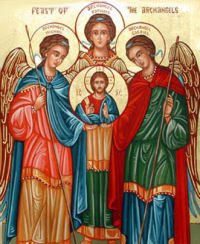
SANCTIFYING THE MONTH
http://home.earthlink.net/~mysticalrose/month.html
+J.M.J+
As with the weekly devotions discussed in the last article, popular Western Catholic custom has assigned a specific devotion to each month:
January - The Infant JesusThe Spiritual Meaning of Birthstones
February - The Blessed Trinity
March - Saint Joseph
April - The Death and Resurrection of Christ (for Lent and Easter)
May - The Blessed Virgin Mary
June - The Sacred Heart of Jesus
July - The Precious Blood of Jesus
August - the Immaculate Heart of Mary
September - The Holy Cross (or The Seven Sorrows of Mary)
October - The Holy Rosary
November - The Holy Souls in Purgatory
December - The Coming of Christ (Advent, Second Coming, etc.)
Long before the modern "New Age" interest in "crystal power", medieval Christians believed that gemstones had certain "virtues", that is, the ability to strengthen the body and fight disease. Marbod of Rennes, an eleventh century Bishop, wrote a work called De Lapidibus ("the Book of Gems"), which described properties allegedly present in sixty different gemstones. Saint Hildegard of Bingen, a twelfth century visionary, dedicated a whole section to her work Natural History on the healing power of certain stones. Medieval lapidaries, such as the Physiologus, often drew spiritual lessons from the characteristics of precious and semi-precious stones.
In the spirit of such lapidaries, the following is a list of traditional birthstones and their spiritual symbolism:
"Whoever perseveres to the end shall be saved" -Matthew 10:22February - Amethyst = Peace of Mind
"Peace I leave with you, my peace I give to you" -John 14:27
March - Bloodstone = Spiritual Virtue
"Who shall ascend to the mountain of the Lord...
The one with clean hands and a pure heart" -Psalm 24:3-4
April - Diamond = Purity
"Blessed are the pure in heart for they shall see God" -Matthew 5:8
May - Emerald = Faithfulness
"But the fruit of the Spirit is...faithfulness" -Galatians 5:22
June - Pearl = Faith
"The kingdom of heaven is like a merchant seeking fine pearls who,
finding one of great price went and sold all he had and bought it" -Matthew 13:45-46
July - Ruby = Devotion to Duty
"Let us not grow weary in doing good,
for in due time we shall reap if we do not lose heart" -Galatians 6:9
August - Sardonyx = Doing the Will of God
"If you love me, keep my commandments" -John 14:15
September - Sapphire = Divine Love and Mercy
"Be merciful, as your Father in heaven is merciful" -Luke 6:36
October - Opal = Hope
"Christ in you, the Hope of Glory" -Colossians 1:27
November - Topaz = Abandonment to Divine Providence
"Your kingdom come, your will be done on earth as it is in heaven" -Matthew 6:10
December - Turquoise = Spiritual Fervor
"I delight to do your will, O my God, your law is within my heart" -Psalm 40:8
Pope's Intention:
October
- Peace. That the Lord may grant peace to those parts of the world most battered by war and violence.
- World Mission Day. That World Mission Day may rekindle in every believer zeal for carrying the Gospel into all the world.
- http://www.apostleshipofprayer.org/2014english.html
Fw: Donald
sent you a video: "October: Month of the Rosary"
Sancta Maria Abbey: http://www.nunraw.com.uk (Website) Blogspot :http://www.nunraw.blogspot.co.uk domdonald.org.uk
On Tuesday, 30 September 2014, 11:06, YouTube <noreply@youtube.com> wrote:
|





.jpg)




